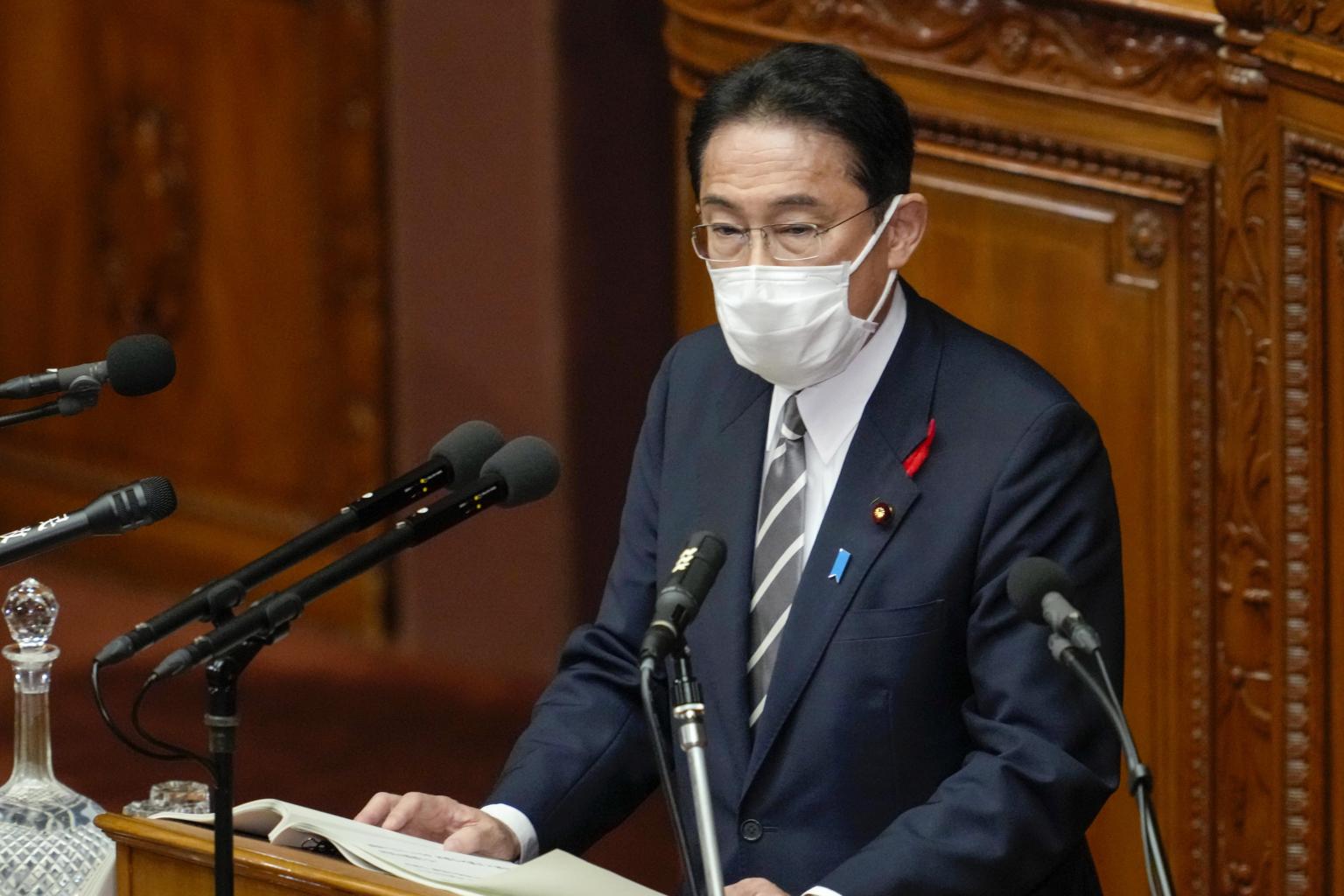Japan PM Kishida spells out grand vision in policy speech with few specifics
Sign up now: Get insights on Asia's fast-moving developments

Japanese Prime Minister Fumio Kishida's 25-minute speech contained few specifics on how he plans to achieve many of his long-term goals.
PHOTO: EPA-EFE
TOKYO - Japanese Prime Minister Fumio Kishida, laying out his grand vision for the country, borrowed buzzwords like wealth distribution, digitisation and climate change in his first policy address to Parliament on Friday (Oct 8).
He also vowed to lead Japan out of the Covid-19 crisis by "preparing for the worst" and putting together a stimulus package that includes grants for hard-hit businesses and higher wages for healthcare workers.
Yet his 25-minute speech contained few specifics on how he plans to achieve - or even fund - many of his long-term goals. Japan has the worst debt-to-gross domestic product ratio among advanced economies, at about twice the size of its economy.
He did not spell out the size of the stimulus package, though he had on the party election campaign trail given such ballpark figures as "tens of trillions of yen" and "at least 30 trillion yen (S$365.5 billion)".
Questions over the lack of details and perceptions that Japan could slide back on reforms under Mr Kishida, 64, have caused markets to slide in what investors have dubbed the "Kishida shock".
While markets tend to rally under a new leader, the Nikkei 225 index has fallen 5.1 per cent since Mr Kishida won the Liberal Democratic Party (LDP) election on Sept 29.
He was sworn in on Monday as Japan's 100th Prime Minister, but already seems to be facing an uphill climb to win public confidence. Approval ratings stood at between 45 and 59 per cent across four media polls this week, among the lowest for a new PM.
The LDP will face its first electoral contests under Mr Kishida with a by-election for two Upper House seats on Oct 24, before a general election for the Lower House on Oct 31.
Still, Mr Kishida's government is already facing its first scandal. Weekly tabloid Shukan Bunshun reported this week that Digital Minister Karen Makishima had, as chief of an LDP committee on digital strategy, been treated in 2019 and last year to meals worth 50,000 yen by telecommunications firm NTT.
Dr Makishima, 44, said it was "part and parcel of a politician's job to exchange and listen to opinions", while the PM did not wade into the controversy. Several bureaucrats were punished in a similar scandal last year.
In the Diet on Friday, Mr Kishida gave his predecessor Yoshihide Suga credit for his Covid-19 strategy that has seen vaccination rates soar despite a late start, and the number of infections dramatically plunged in recent weeks.
He stressed that dangers lurk and that medical resources must be strengthened. But he did not offer any clues as to when Japan might resume its Go To Travel domestic tourism subsidy scheme, nor reopen its borders for leisure travel.
Mr Kishida also promised to achieve a "new form of Japanese capitalism" that emphasises fairer wealth distribution, noting widening disparities, given that the fruits of economic growth have not been equally passed down.
He pledged to promote wage growth, including through "tax support" for companies that boost incomes, though it remains unclear how successful this will be, as former premiers, Mr Suga and Mr Shinzo Abe, had broached this to little avail.
"Without distribution there will be no growth including in consumption, and we must create a virtuous cycle for growth," Mr Kishida said.
He also promised a 10 trillion yen research and development fund this year for new technologies including quantum computing and climate change.
This pledge is timely after Dr Syukuro Manabe, born in Japan but now a United States citizen, won the Nobel Prize in Physics this week for his work in climatology but criticised Japan's myopic approach towards "curiosity-driven research".
Mr Kishida, a Hiroshima native, disavowed nuclear weapons in his policy speech but did not mention anything about Japan's reliance on the US nuclear umbrella under their security alliance, which extends to threats over the Senkaku/Diaoyu islets that are administered by Tokyo but claimed by Beijing.
Neither did he discuss the expected role of nuclear power under Japan's updated 2030 energy mix that will be released ahead of next month's COP26 climate summit in Glasgow.
On foreign policy, Mr Kishida stuck to the same lines of working with fellow democracies, but also stressed the need to stabilise ties with China, South Korea and Russia, with which Japan's relations are tainted by history and geopolitics.
The speech drew applause from LDP lawmakers but Mr Kishida was heckled by the opposition numerous times during the speech.
The opposition has been disgruntled by the LDP government's refusal to convene the Diet for policy debates, noting a possible violation of the Constitution. A probe over a similar refusal under Mr Abe in 2017 is now before the Supreme Court.
Mr Kishida, however, vowed to bridge divisions, citing Japan's "One Team" slogan at the Rugby World Cup in 2019.
"As the saying goes 'If you want to go fast, proceed alone. If you want to go far, proceed together'. To that end, in the spirit of 'One Team', we will overcome divisions and forge a new era together."


